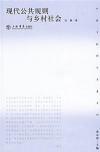
Zhang Jing 张静
Shanghai Bookstore Publishing House 上海书店出版社, March 2006
Reviewed by He Xu (PhD candidate, Sociology, Fudan University; HYI Grassroots Training Program Fellow)
The author frames her argument about the development of rural society in contemporary China in terms of debates on Chinese state-building. Unlike others who focus on the extension of state power into local society, she questions the use of the concept of state-building itself. According to Zhang Jing, previous studies tried to explain changes in local society by the building of the state, during which tax collection and centralization of power eroded the authority of local elites, causing the disintegration of local society (P44). She points out that previous scholars presumed a negative judgment towards state-building, and she claims instead to use the concept in a normative sense (P44).
Zhang cites the example of France to show that the process of state-building includes not only the centralization of power but also—even more important—the transformation of the legitimacy of state power and of the relation between the state and individuals (citizens) (P47). By using a dichotomous concept of “public” and “private”, she argues that the building of the modern state, in its normative sense, constitutes a public field in which rules and citizenship regulate relations among individuals, and between individuals and public authority. Using five cases, Zhang argues that public life in rural society is still regulated by personal ties (geren guanxi), instead of public rules. In other words, the exercise of state power has not completed the task of creating and validating public rules for a new kind of social life. Not to mention creating a unique national identity to replace local community identities, which Zhang believes to be a key element of state-building.
Zhang makes a very good point that for studies on rural China, compared to institutional changes, changes in the meaning worlds of local people are of extreme importance. Meaning systems generate rules and regulations (or cultural codes) which people adopt to guide and form social interactions. And social interactions in turn produce social structure. That is why Zhang redefines state-building to go beyond Tilly’s definition of the state. She also challenges assertions that the process of state-building caused disintegration in rural society. In Zhang’s view, state-building may be incomplete or even non-existent in rural society.
The book is based on abundant stories collected via numerous in-depth interviews, questionnaires and documents. The stories successfully present a comprehensive and vivid picture of public life in villages, covering local authority, local elite identification, grassroots elections and collective property. They are nicely organized to keep the integrity of the event while also being closely related to the theoretical argument.
Its inspiring theoretical argument and remarkably rich material make this book a must read for those interested in grassroots social change in rural China. Still there is a problem with Zhang’s definition of the state. She is right in saying that simply using the exercise of power (P55) to define state-building tends to be negative rather than analytical. But by giving the state a normative definition (mostly from the perspective of Functionalism and Social Darwinism), she actually falls into the same trap as those whom she has criticized. In her dichotomous value system, the state occupies the modernity side while the village is inevitably in the opposite side. Hence Zhang believes that an important task of state-building should be the replacement of community identity by national identity, which she believes is not happening. On the contrary, many recent researchers have pointed out that a unique national identity can hardly replace other identities, and that strong community ties are in fact essential for a democratic system.
